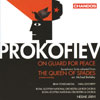Prokofiev On Guard for Peace
A Prokofiev pairing that includes a notorious Stalin Prize-winning cantata
View record and artist detailsRecord and Artist Details
Composer or Director: Sergey Prokofiev
Genre:
Vocal
Label: Chandos
Magazine Review Date: 7/2009
Media Format: CD or Download
Media Runtime: 0
Mastering:
Stereo
DDD
Catalogue Number: CHAN10519

Tracks:
| Composition | Artist Credit |
|---|---|
| On Guard for Peace |
Sergey Prokofiev, Composer
Irina Tchistjakova, Mezzo soprano Neeme Järvi, Conductor Niall Doherty, Boy alto Royal Scottish National Chorus Royal Scottish National Orchestra Sergey Prokofiev, Composer |
| (The) Queen of Spades |
Sergey Prokofiev, Composer
Neeme Järvi, Conductor Royal Scottish National Orchestra Sergey Prokofiev, Composer |
Author: David Gutman
Neeme Järvi has a background in the old Soviet bloc and a long track record in conducting Prokofiev’s music for the Chandos label. His approach is urgent and forthright, rejecting the subtler inflexions of Temirkanov’s reading. Bold sonics make his Scottish forces sound as if they too might hail from St Petersburg and the swimming-pool resonance swallows up the flaws. Soloist Irina Tchistjakova, a youngish mezzo of slightly alarming old-school vibrancy, also narrates. Under Temirkanov the ninth movement “conversation on the airwaves” is recited, more threateningly, by a man.
The unexpected pairing is a Royal Ballet commission perpetrated by Michael Berkeley, chiefly from material Prokofiev had intended to underscore a projected Mikhail Romm film of The Queen of Spades. Berkeley’s treatment seems diffuse, probably because the best bits had already been recycled by Prokofiev himself, notably in the slow movement of the Fifth Symphony. Prokofiev fanciers will wonder why an actual ballet score such as On the Dnieper (similarly plotted) or a finished orchestral piece like the Russian Overture could not have been pressed into service instead.
Discover the world's largest classical music catalogue with Presto Music.

Gramophone Digital Club
- Digital Edition
- Digital Archive
- Reviews Database
- Full website access
From £8.75 / month
Subscribe
Gramophone Full Club
- Print Edition
- Digital Edition
- Digital Archive
- Reviews Database
- Full website access
From £11.00 / month
Subscribe
If you are a library, university or other organisation that would be interested in an institutional subscription to Gramophone please click here for further information.




